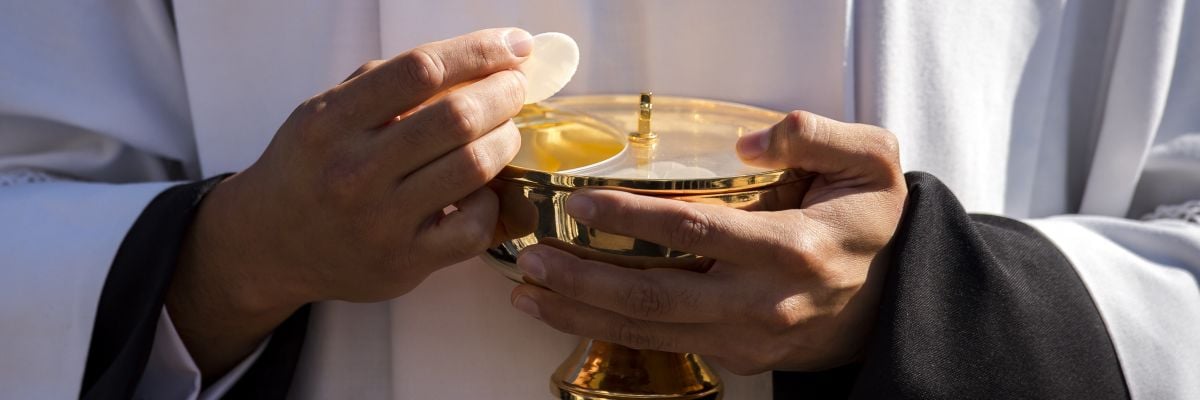
Christmas provides a wonderful time to teach the faithful anew the sublime nature of the Holy Eucharist, that Jesus Christ became man not simply to save the world (Luke 2:10-11) as the Messiah king (Matt. 2:1-2), but also so that we could become children of God, beginning in baptism, and in an ongoing and ever-deepening manner through reception of our Lord’s body, blood, soul, and divinity in Holy Communion (CCC 1374).
We receive Jesus under the appearances of bread and wine at Mass, a reality hinted at in St. Matthew’s infancy narrative, for our Lord is born in Bethlehem (Matt. 2:1, 5-6), which means “house of bread.” In addition, his Blessed Mother “laid him in a manger” (Luke 2:7; see also 2:12), which normally serves as a place from which animals feed, but here indicates, as Scripture later affirms, that Jesus would serve as genuine consumptive sustenance for his followers (see John 6:51-58).
Given that only twenty-one percent of U.S. Catholics participate in weekly Sunday Mass, just one-third to one-half believe in the Real Presence, and the fact that Christmas Masses draw the biggest crowds annually, pastors and other priests should use Christmas worship as an opportunity to emphasize that the Mass is “the source and summit of the Christian life” (Catechism of the Catholic Church 1324), and that, as Jesus teaches, “he who eats my flesh and drinks my blood has eternal life, and I will raise him up at the last day” (John 6:54; see CCC 1362-70).
But are we prepared to receive our Lord so profitably in Holy Communion? Jesus also teaches we must keep his commandments to be his disciples (John 8:31-32; 14:21), which, St. Paul adds, includes not receiving our Eucharistic Lord “in an unworthy manner,” i.e., in a state of mortal sin (CCC 1395; 1421), lest we “be guilty of profaning the body and blood of the Lord” (1 Corinthians 11:27).
Given the greater presence of infrequently participating Catholics at Christmas liturgies, it is an act of charity for priests to remind all the faithful gathered of the importance of receiving the Eucharist in a state of grace, providing a brief primer on mortal sin. And, just as alienated spouses reconcile before resuming marital intimacy, so too we need to be reconciled with Jesus after grave wrongdoing before we can renew our intimate sacramental Communion with him.
Hearing you shouldn’t receive the Eucharist can be painful for a Catholic, as Judge Sara Smolenski, a district court judge in Michigan, recently reported after her pastor, Father Scott Nolan, directed her in a private conversation not to come forward to receive Communion, because she had legally contracted a same-sex “marriage.”
“How come all these other priests everywhere—good and decent, wonderful priests—they know me and they give me Communion?” Smolenski asked in an interview with a local television station.
Priests should have the courageous love to tell parishioners what they need to hear, Father Nolan responds, not necessarily what they want to hear, because only the truth is truly remedial and medicinal. “That other priests do or don’t do something,” he adds, “is to say, ‘OK, I’m not the one responsible for them.’”
Indeed, a good shepherd always looks out for the spiritual welfare of his flock.
For those not prepared to receive the Eucharist, looking out for them also includes inviting them to make a spiritual communion at Mass and to receive the Sacrament of Confession as soon as possible. In this light, there is good reason to make Confession more available over the Christmas holidays, especially for those who haven’t been to Confession for a long time.
In their Christmas homilies, priests could also generously invite fallen-away Catholics to come to “the front of the line” by calling the parish to make an appointment. Another idea is for priests to encourage regularly participating Catholics to charitably invite fallen-away friends and family to go to Confession before receiving our Lord in the Eucharist.
Though he became flesh “and dwelt among us” (John 1:14), Jesus remains a divine person and thus, in his holiness, he can seem unapproachable, especially when one has a guilty conscience. That’s why sharing at Christmas the examples of real-life saints who have seen major conversions can illustrate that forgiveness and holiness are possible, especially with the great blessings associated with Confession and worthy reception of the Eucharist.
All these measures can help Catholics yearn to receive the Eucharist well, i.e., as “the medicine of immortality” (CCC 1331; 1405), instead of “eating and drinking a judgment” upon themselves by partaking in a state of mortal sin (1 Corinthians 11:27-30).
Finally, getting ready to participate in the Sacrifice of the Mass at Christmas and year round, including welcoming Jesus in Holy Communion, is all proximate preparation for our Lord’s Second Coming (CCC 681-82), to which the Divine Child’s Yuletide birth is ultimately ordered.
So priests should proclaim—and the faithful receive—our Lord’s full and liberating Gospel (John 8:31-32), so that through worthy reception of the Eucharist we can all experience the peace that only Jesus can give (John 14:27), now and forever.



